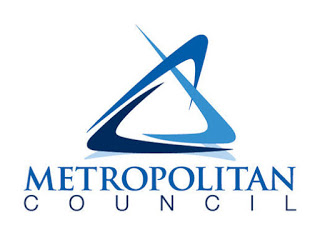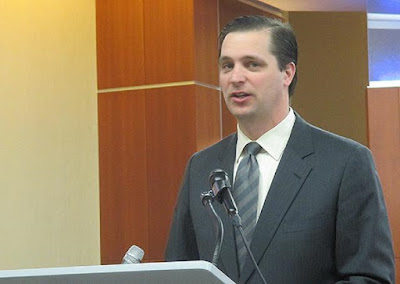Archive for the ‘Met Council’ Category
At some point, the Met Council’s structure will get changed. The Met Council was created in 1967 when ” it lacked any regional perspective in governance or long-term vision. Development was intruding on such basics as sewage treatment and water supplies with untreated waste going into the Mississippi and Minnesota rivers and lakes and streams. Hundreds of individual septic systems and private wells foretold a public health disaster waiting to happen. There were no regional parks. Natural areas were under threat from haphazard housing projects and shopping centers.”
The key part of John Diers’ op-ed is the opening paragraph, which says “We recommend that the 1967 Legislature create a Metropolitan Council, directly elected by popular vote of the people, to solve the pressing area wide governmental problems of the Twin Cities in a coordinated manner. The Council would be responsible only for those area wide functions and services which cannot be handled adequately by municipalities and counties and which are specifically assigned to the Council by the Legislature.”
51 years later, the Met Council is still an unaccountable body of government whose members are still appointed by the governor. That certainly wasn’t the type of government that the people who advocated for the Met Council envisioned.
Congressman Jason Lewis has introduced an amendment to legislation in Congress that would require all metropolitan planning organizations that receive federal funds have locally elected officials on their boards. The Metropolitan Council is presently exempt from that requirement having been grandfathered under earlier legislation. In a statement from Rep. Lewis:
“Our amendment does not seek to change the operations or scope of the Met Council. It does not attempt to change the activities of the board. It simply requires that for a board to be in compliance they need to have locally elected official representation consistent with every other MPO in the country.”
It’s time for the Met Council to comply with federal law. It isn’t doing that right now.
According to this Strib editorial, the Met Council is just terrific. Apparently, they don’t think the same about Jason Lewis. The editorial’s opening paragraph states “Second District Republican U.S. Rep. Jason Lewis is attempting to apply the heavy thumb of the federal government to tip the scales in a long-running debate over the composition of the Metropolitan Council. We think Lewis and the feds should keep their hands off. This is a matter Minnesotans can and should decide for themselves.”
Actually, it isn’t just a local matter. That’s because many bodies like the Met Council exist across the nation. Further, since the Met Council has taxation authority and the authority to usurp local jurisdictions, it’s insane to think that they shouldn’t be accountable to the people.
The editorial also says this:
We’ve also been skeptical about creating a “council of governments.” Its members would be politically beholden to the local constituencies that elected them, rather than the region as a whole. Instead, we favor instituting staggered terms for council members and employing a panel of local officials as a screening committee to recommend council candidates to the governor.
What’s so virtuous about a panel that’s accountable only to the governor? I don’t see anything worthwhile about that. Let’s further ask the question at the heart of this argument: why do these bureaucrats, plus the Star Tribune, fear the people? Governments are supposed to be of, by and for the people. This nation was started in part by the belief that there should be no taxation without representation. Who does the Met Council represent? The Governor?
That doesn’t sound like a governing body that governs with the consent of the people. That sounds like a dictatorial body.
The Met Council is filled with special interests. For instance, Jennifer Munt ‘represents’ District 3, “which includes the Hennepin County cities of Chanhassen, Deephaven, Eden Prairie, Excelsior, Greenwood, Long Lake, Minnetonka, Minnetonka Beach, Mound, Orono, Shorewood, Spring Park, Tonka Bay, Wayzata, and Woodland. Munt is the Public Affairs Director for AFSCME Council 5, where she leads marketing, communications and media relations.”
This isn’t about representing the people. It’s about representing the special interests:
Previously [Munt] was the Communications Director for the Hiawatha LRT project (2000-2005) and an Outreach Coordinator for the Metropolitan Council (1999-2002).
Munt hasn’t represented people in the past. She’s represented governments and special interests.
Here’s Jason Lewis’s statement on what his amendment actually does:
“Currently, and in contrast to federal law, all 17 members of the Met Council are appointed by the Governor of the State of Minnesota. MPOs nationwide are created with the intent to improve infrastructure planning and, especially, transit investments on behalf of constituencies across a given region. In 2012, Congress rightly determined that locally elected officials are best suited to represent those same groups. In our region, the failure of the Met Council to include locally elected officials as part of their governing board has undermined this key aspect of accountability to the people they represent.”
Background:
MAP-21 required that federally recognized MPOs that participate in transit improvement program planning, long-range capital plans, coordination of transit services, and that carry out other state activities, all of which rely on federal funding and grants, meet certain requirements. These requirements include a board makeup of locally elected officials, public transportation officials, and appropriate state officials.
The Metropolitan Council (Met Council) currently has a Transportation Advisory Board (TAB) that consists of local elected officials, but in August of 2015, the Federal Highway Administration and the Federal Transit Administration ruled that the TAB lacked any voting authority and therefore the Met Council did not meet the threshold of MPO compliance.Unfortunately, the Obama administration used a separate clause in federal law to “grandfather” the Met Council into compliance.
Our amendment does not seek to change the operations or scope of the Met Council. It does not attempt to change the activities of the board. It simply requires that for a board to be in compliance they need to have locally elected official representation consistent with every other MPO in the country.
In other words, the Strib appears to be running interference for the Met Council. Rep. Lewis’s amendment doesn’t change the Met Council’s responsibilities. It simply requires the Met Council into compliance with existing federal law. That isn’t “tipping the scales” in one direction or another, as the Strib implies. It simply forces the Met Council to comply with existing federal law.
Technorati: Met Council, Metropolitan Planning Organization, Jennifer Munt, AFSCME Council 5, DFL, Jason Lewis, Federal Highway Administration, Transportation Advisory Board, Federal Transit Administration, Reforms, Republicans
Thursday night, I wrote this post about Sen. Cwodzinski’s interview with a local paper. One of the things covered was infrastructure. The reporter asked “What are your thoughts about the latest delays in the Southwest Light Rail Transit project?” Sen. Cwodzinski replied “These delays are completely unacceptable. Our state has put together the resources necessary to get this done, and now the federal government is leaving us waiting. As I said earlier though, I am very hopeful that out state and the federal government can build an effective partnership on infrastructure. Southwest LRT is the cornerstone of that, so am hopeful that we will receive the federal funds this year.”
It’s time for Sen. Cwodzinski to stop relying on wishful thinking. It’s time for him to deal with reality. Kim Crockett’s article reports that the “FTA is not recommending funding for any projects in Minnesota. The projects that have applied for federal funds are Southwest LRT, Bottineau LRT, the Metro Orange Line bus rapid transit along 35W, and the Metro Gold Line bus rapid transit in St. Paul. The FTA is limiting funding to ‘projects with existing full funding grant agreements. For the remaining projects in the CIG program, FTA is not requesting or recommending funding. Future investments in new transit projects would be funded by the localities that use and benefit from these localized projects.'”
This is a major blow to Gov. Dayton and Sen. Cwodzinski.
The Met Council, under [Gov. Dayton’s] leadership, developed a long-term transportation and housing plan that was entirely based on light rail expansion into the suburbs, with subsidized housing along the LRT to drive ridership and transform the metro area under a vision called “Thrive MSP 2040.”
The plan has been rejected by the five suburban counties in the metro area. The Legislature in 2017 withdrew its support from Southwest LRT and placed the Met Council under a quarterly audit by the Office of Legislative Auditor.
Apparently, Sen. Cwodzinski isn’t in touch with his constituents. They’ve rejected the Met Council’s vision for transportation. Seeing that, the GOP legislature pulled funding for these boondoggles, then ordered quarterly audits of the Met Council by the legislative auditor’s office. I’d consider that a harsh slap to the Met Council’s face. After watching this video, hopefully lots of people will think that the Met Council needs a harsh slap in the face:
First, my compliments to the ladies that put the video together. It’s long overdue. Well done. After watching it, I’m questioning what (if?) Gov. Dayton and Sen. Cwodzinski were thinking. Next, Sen. Cwodzinski’s constituents should ask themselves if they’re ok with unaccountable central planners making expensive decisions that dictate what types of things their cities and their neighborhoods will have.
Finally and most importantly, people should question whether they like the thought of not having a say in their neighborhood’s matters. I’m betting that they’d prefer keeping their decisions in their hands, not in the Met Council’s hands.
Technorati: Steve Cwodzinski, Mark Dayton, Southwest Light Rail, Central Planning, Bottineau Light Rail, Transportation, DFL, Center for the American Experiment, City Council, Accountability
Kim Crockett’s post about her recent trip to our nation’s capitol focused on the work that the Center for the American Experiment is doing to thwart the Met Council’s Thrive 20240 blueprint.
In her post, Ms. Crockett wrote that “DFL Governor Mark Dayton’s plan, like many ‘blue state’ governors, uses ‘transit oriented development’ or TOD, to pull money out of the suburbs and greater Minnesota to fund and re-enforce a city centric power model. That model shifts how and where people live, and how they get around, to change the political landscape in favor of left-wing control of local and state government. If ‘Thrive’ succeeds, we will effectively lose self-governance at the local, and even state, level in favor of unelected bureaucrats.”
First, the Met Council’s transportation blueprint is outdated. Next, it isn’t based on listening to the communities and residents it’s supposed to represent. Third, the Met Council’s transportation blueprint ignores the fact that the American people don’t want to get herded like cattle into a one-size-fits all transportation blueprint.
With more people being able to work from home and with more people buying their things from Amazon, E-Bay, Craigslist and other online outlets, the need for transit is waning, not waxing. While Al Gore hates urban sprawl, the American people apparently have voted with their mortgages in favor of spreading out.
Then there’s this:
These TOD plans rely on crony capitalism to thwart citizen opposition to these billion-dollar boondoggles. There are construction and engineering firms and armies of lawyers and consultants, lined up to take their cut of the $2 billion for SWLRT. And that is just the start: then comes Bottineau LRT and others. They press their case with help from the business chambers and K-Street lobbyist here and in D.C.
Here in St. Cloud, we’re fighting against extending the Northstar rail project from Big Lake to St. Cloud. While extending Northstar isn’t as high-profile of a project as building SWLRT is, it’s still built on the same central planning crony capitalist principles.
Another thing that SWLRT and Northstar have in common is that they’re massive wastes of the taxpayers’ money. After construction, they’ll still need massive operating subsidies. Think about that. Northstar isn’t making money. It never will. Extending it from Big Lake to St. Cloud just adds to the money the special interests will need to take from taxpayers. SWLRT is no different. Before explaining that statement, I’d suggest that you watch this video:
As you watch the video, count how many different pieces of infrastructure have to be built before SWLRT is operational. Then think of how many people will use SWLRT vs. how many will continue to use the highways and city streets. (You can make the same comparison with Northstar.) SWLRT and Northstar aren’t solutions to Minnesota’s transportation problems. They’re impediments to the solutions.
Technorati: SWLRT, Northstar, Operating Subsidies, Transit-Oriented Development, Central Planning, Met Council, Mark Dayton, Lobbyists, Special Interests, DFL
Preya Samsundar’s article on the SWLRT line is informative from the standpoint of how intent Gov. Dayton’s political appointees are in spending the taxpayers’ hard-earned money on another light rail boondoggle.
Ms. Samsundar writes “Southwest Light Rail will begin construction, despite a decision by the federal government to rescind federal funds. MPR reports that the new Met Council Chair, Alene Tchourumoff, plans to start construction on the newest addition to Minnesota’s light rail enterprise by 2019.” Later in the article, Ms. Samsundar writes “However, the dissolution of the Counties Transit Improvement Board in May left Hennepin County footing a $289 million bill for their share of Southwest Light Rail, approximately $103.5 million more than initially projected. As Alpha News reported, the dissolution leaves the additional burden on Hennepin County taxpayers who will see a half-cent increase in their local sales tax.”
That’s just the tip of an expensive iceberg. The $289,000,000 bill is just part of the expense. Then there’s this:
The nearly 15 mile light rail extension that plans to connect wealthy western suburbs to the Twin Cities is still $900 million short, but that is not stopping Tchourumoff from moving forward with the plan.
Of course, that isn’t stopping her. It isn’t like she has to face voters. It isn’t like Ms. Tchourumoff is spending her own money. It’s exceptionally easy to spend other people’s money.
This is a total boondoggle for taxpayers across the state. In addition to tax increases in the Twin Cities, which I don’t care about, taxpayers in rural Minnesota get stuck with part of the tab of subsidizing this boondoggle. Let’s be clear. There isn’t a light rail line in Minnesota that breaks even. There isn’t a light rail line that comes close to breaking even. That’s why I call these projects boondoggles. For that matter, I could call these projects ideologically-inspired boondoggles.
The bottom line is simple. The Met Council isn’t interested in listening to people. They’re only interested in serving Gov. Dayton. If that costs taxpayers hundreds of millions of dollars, the Met Council is fine with that. Like I said earlier, it isn’t like they’ll be held accountable by Gov. Dayton.
Technorati: Met Council, Alene Tchourumoff, Hennepin County, SWLRT, Mark Dayton, Political Appointees, Social Engineering, CTIB, DFL
In this post, I asked several questions, including why do Democrats think that unaccountable bureaucrats with a constituency of one person (the governor) are best-suited to do region-wide infrastructure planning?
People that don’t have to worry about accountability to citizens inevitably get corrupted or stop listening to the people or both.
Something that Katherine Kersten wrote in this article should raise red flags. She wrote “The council’s vision to transform how the people of the Twin Cities region live and get around has two prongs. First, the Thrive plan will promote compact, high-density housing and “transit-oriented development” (TOD). TOD seeks to ‘pivot’ from an “auto-friendly” to a ‘transit-friendly’ transportation system by discouraging driving and pushing people to walk, bike or take public transit to work and leisure activities. Both Thrive’s housing and transportation policy plans exhibit a striking hostility to travel by car, and to the freedom and mobility that ownership of a personal vehicle brings.”
Here’s a question for LFR readers: should any government agency have the authority to push its citizens towards “transit-friendly” transportation systems? Here’s another question that dovetails off the first question: should an unelected government panel be allowed to “exhibit a striking hostility to travel by car”? Shouldn’t those decisions be made by the citizens themselves?
If you think that unaccountable bureaucrats that don’t have to listen to the people make better decisions than elected officials that have to answer to the people, I’d love seeing the proof for that. Honestly, I don’t think it exists.
Later in the article, Ms. Kersten wrote this:
The plan will lavish funds (at least $2.7 billion) on fixed-rail transit while virtually ignoring funding for expanding roads, which are vital to regional prosperity and on which 99 percent of area trips rely in some way. Despite the council’s drive for densification — which will jam more cars into a smaller space — the Thrive plan declares that “expanding the roadway system is not a sustainable way to address congestion, climate change, equity and livability.”
It’s time for the Met Council to disappear or, at minimum, to have their authority reduced. It’s obvious that they’re an organization with an ideological agenda. It’s obvious that they aren’t that worried about what the citizens of the Twin Cities want.
The transportation plan greatly favors the urban core over suburbs and exurbs and uses limited transportation funds as a bludgeon to promote its social agenda of dispersing poverty. In response, county boards of the five “ring” counties — Anoka, Carver, Dakota, Scott and Washington — have unanimously denounced the council’s plan.
And around and around we go. The Met Council doesn’t care what Anoka, Carver, Dakota, Scott and Washington counties want. They’re shaped almost exclusively around the belief that fixed rail transit is the way to go. It won’t take long for the people to reject that foolishness.
Technorati: Met Council, Accountability, Mark Dayton, Ideologues, Social Engineering, Bureaucrats, Cronyism, Transit-Oriented Development, DFL, Thrive 2040
Friday night during the Almanac Roundtable segment, DFL activist Abou Amara insisted that the legislature had frequently reformed the Met Council. When I heard that, I replayed that part of the segment (I always DVR it) to make sure I heard it correctly. Indeed I’d heard it correctly. Simply put, Amara’s contribution to that part of the roundtable was BS. The legislature has changed the Met Council’s responsibilities frequently but it hasn’t reformed it.
Let’s think of it this way. Each legislator, each city councilmember, each county commissioner and each school board member have hundreds, if not thousands of constituents. The Met Council has a single constituent — the governor. They don’t have to listen to members of the metro city councils, the Hennepin County commissioners and they especially don’t have to listen to the residents of the 7-county metro area. If they decide to ignore the city council, it doesn’t matter as long as they do what their constituent wants them to do.
Another part of Amara’s argument to keep the Met Council around is because there’s a need for long-term planning. That’s a fair point but it doesn’t prove that the Met Council is needed to accomplish that task. In fact, it’s proof that it isn’t needed. Governing bodies that aren’t accountable to people shouldn’t have any authority. The Met Council under Gov. Dayton is a patronage position.
Kathy Kersten’s column nails it in terms of the Met Council’s mentality:
“The people designing your city don’t care what you want.” That’s how forbes.com columnist Joel Kotkin sums up the mentality of today’s so-called “smart growth” urban planners. Here in the Twin Cities, we have a perfect example of what Kotkin is warning about: “Thrive MSP 2040,” the Metropolitan Council’s 30-year development framework for our seven-county metro area.
Here’s something else worth thinking about when thinking whether the Met Council needs a transformation. First, let’s start by noticing that Amara thinks we need to keep long-term planning out of the hands of “people who face election once every 2 or 4 years.” Question: where does Amara think we’d find these long-term planners? Are they ‘experts’ in their field? If they’re experts in their field, would that lead them to not listen to the residents of the seven-county metro? Would they only listen to like-minded advocates and lobbyists?
That’s what’s happening now. The Met Council isn’t listening to people in Prior Lake, Eden Prairie, Maplewood, Woodbury, Plymouth, et al. They have the authority to raise taxes. They don’t face the voters. Ever. That’s the worst possible system imaginable.
The truth is that Abou Amara isn’t telling the truth. The Met Council hasn’t undergone positive change except if you think mission creep is positive change. The Republican gubernatorial candidate that puts together a thoughtful plan that puts the people in charge of the Council will have a positive platform to tout to voters. It’s time to straighten this corrupt system out.
This article announcing Gov. Dayton’s appointing of a new chairperson of the Met Council highlights the possibility of that appointee facing pushback when her committee hearing is held.
According to the article, “The Met Council has new leadership. On Tuesday, Gov. Mark Dayton announced that current Chair Adam Duininck will step down from his role as head of the Met Council. In his place, Dayton announced the appointment of Minnesota State Rail Director Alene Tchourumoff to head the Met Council.”
Further into the article, Alpha reporter Preya Samsundar reports “Sen. Dave Osmek of Mound, who is expected to announce his candidacy for governor this summer, had been pushing pieces of legislation to reign in, and more recently, abolish the Met Council. On the last day of session, Osmek turned in a 214-page piece of legislation which states, “A bill for an act relating to local and state government; abolishing the Met Council.” Osmek has been pushing for reformation of the Met Council since 2015.”
Sen. Osmek’s credentials as a reformer are high. Jason Lewis’ reformer credentials are pretty high, too. Rep. Lewis is working hard in DC against organizations like the Met Council:
In Washington, Rep. Jason Lewis is also doing his part to ensure the council goes no further. In March, a bill authored by Lewis passed through the Transportation & Infrastructure Committee in the United States House of Representatives.
“Under the rule, the Met Council, a Metropolitan Planning Organization (MPO), could have expanded their boundaries and taxed the suburbs to help fund downtown projects,” Lewis told Alpha News at the time. “We’re protecting the ability of local decision makers to do what works for their own communities.”
Thank goodness for Jason Lewis for protecting suburbs like Prior Lake, Shakopee and Chanhassen. Let’s hope we elect a Republican governor and keep our GOP majorities in the Minnesota House and Senate so we can, at minimum, stop the Met Council’s authority to tax people without representing people.
Right now, the Met Council ‘represents’ Gov. Dayton. They don’t represent the people. Still, they’ve been given the authority to levy taxes. There’s no way that’s right.
Technorati: Adam Duininck, Alene Tchourumoff, Met Council, Mark Dayton, DFL, Jason Lewis, Metropolitan Planning Organization, Dave Osmek, Conservatives, MNGOP
There’s no question about whether Gov. Dayton is dishonest. The only question left to determine is how dishonest Gov. Dayton is. I’d say that he’s exceptionally dishonest if I’m using this article to determine Gov. Dayton’s dishonesty.
According to the article, Gov. Dayton ” said that ‘the cost of inaction’ by state lawmakers had caused the price increase.” Gov. Dayton knows that the legislature has nothing to do with the price increase because Adam Duininck told him that the SWLRT project was being put off by the federal government. Commissioner Duininck told Gov. Dayton that “the federal government has no plans to execute a funding agreement until sometime in 2017 because of ongoing litigation regarding the project.”
The “ongoing litigation that they’re talking about is something I’ve started calling the Tunheim Lawsuit. It’s a lawsuit being tried in federal court. The Tunheim Lawsuit won’t start until Sept. 17, 2017. The FTA, aka the Federal Transportation Administration, won’t lift a finger until that lawsuit is settled. The earliest that lawsuit will be settled will be January, 2018.
That’s actually the least of the Met Council’s worries. It isn’t likely that they’ll win the Tunheim Lawsuit. It’s that they have no chance at winning the lawsuit that the Calhoun-Isles Condominium Association might bring. The Calhoun-Isles Condominium Association hasn’t filed a lawsuit yet but if they did, they’d win.
This paragraph is wishful thinking:
The Council, backed by Minnesota Gov. Mark Dayton, has proposed to authorize $103.5 million in debt, with the Hennepin County Regional Real Authority and the Counties Transit Improvement Board contributing a total of $41 million — enough to ensure $900 million in federal dollars for the light rail project.
This isn’t based on reality. It’s based on what the Met Council, the Hennepin County Regional Real Authority and CTIB wish would happen. They know, though, that it won’t. They know it won’t happen because they’ve been told that it won’t happen.
There’s no question that people are resistant to change. They appreciate the familiar, which is why it’s difficult, if not impossible, to change things that are broken. Sometimes, though, a dramatic shake-up is exactly what’s needed. The colonists knew that in the 1770s. There are lots of angry activists in the 21st Century who wonder if it isn’t time for another revolution.
This op-ed, which I linked to in this post, highlights the fact that the “council has broad authority, including the ability to levy taxes” but that the governor is their primary constituent. In the colonists’ times, they started a revolution. One of their chief rallying cries was “No taxation without representation.”
According to Dictionary.com, the definition for No taxation without representation “became an anti-British slogan before the American Revolution; in full, “Taxation without representation is tyranny.” I can’t disagree with that last sentence. Taxation without representation is tyranny.
This paragraph especially stands out:
The mayors in their commentary suggested that elected city and county officials could not handle the workload or think “regionally” while representing both their municipality and a Met Council district.
There’s a simple explanation for these mayors’ preference. They want their initiatives to get rubberstamped and put into place ASAP. What politician enjoys the mess that’s created when making sausage? The Met Council is a mayor’s dream. They get their wish list enacted without having to cut deals with uppity peasants.
This nation’s Founding Fathers understood the appeal of mob rule. That’s why they designed a system filled with checks and balances. They wanted to thwart entities like the Met Council. They wanted the system to be messy because efficient governments are usually out-of-control governments that don’t pay attention to the citizenry, aka the uppity peasants.
Here’s the lengthy list of elected officials that signed onto this op-ed:
Scott Schulte is an Anoka County commissioner. Chris Gerlach is a Dakota County commissioner. Jeff Lunde is mayor of Brooklyn Park. This commentary was also submitted on behalf of the following local government officials. County commissioners: Rhonda Sivarajah, Matt Look, Julie Braastad and Robyn West, Anoka County; Tom Workman and Randy Maluchnik, Carver County; Liz Workman and Nancy Shouweiler, Dakota County; Jon Ulrich, Scott County, and Jeff Johnson, Hennepin County. Mayors: Mark Korin, Oak Grove; Kelli Slavik, Plymouth; Jim Adams, Crystal; Jeff Reinert, Lino Lakes, and Dave Povolny, Columbus. City Council members: Jim Goodrich, Andover; John Jordan, Brooklyn Park; Jeff Kolb, Olga Parsons and Elizabeth Dahl, Crystal; Dave Clark and Jason King, Blaine; Brian Kirkham, Bethel, and Bill Krebs, Columbus.
The time for a dramatic reform of the Met Council is at least a decade overdue. Further, there’s never a good time to give government the authority to raise taxes without giving people the authority to boot the bums out of office.
Technorati: Met Council, Mark Dayton, Taxation Without Representation is Tyranny, Activists, American Revolution, No Taxation Without Representation, Checks and Balances, Founding Fathers, Accountability, We The People






